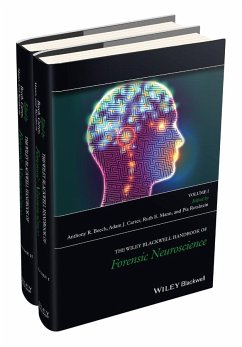Explores how the explosion of neuroscience-based evidence in recent years has led to a fundamental change in how forensic psychology can inform working with criminal populations.
This book communicates knowledge and research findings in the neurobiological field to those who work with offenders and those who design policy for offender rehabilitation and criminal justice systems, so that practice and policy can be neurobiologically informed, and research can be enhanced.
Starting with an introduction to the subject of neuroscience and forensic settings, The Wiley Blackwell Handbook of Forensic Neuroscience then offers in-depth and enlightening coverage of the neurobiology of sex and sexual attraction, aggressive behavior, and emotion regulation; the neurobiological bases to risk factors for offending such as genetics, developmental, alcohol and drugs, and mental disorders; and the neurobiology of offending, including psychopathy, antisocial personality disorders, and violent and sexual offending. The book also covers rehabilitation techniques such as brain scanning, brain-based therapy for adolescents, and compassion-focused therapy.
The book itself:
_ Covers a wide array of neuroscience research
_ Chapters by renowned neuroscientists and criminal justice experts
_ Topics covered include the neurobiology of aggressive behavior, the neuroscience of deception, genetic contributions to psychopathy, and neuroimaging-guided treatment
_ Offers conclusions for practitioners and future directions for the field.
The Handbook of Forensic Neuroscience is a welcome book for all researchers, practitioners, and postgraduate students involved with forensic psychology, neuroscience, law, and criminology.
Hinweis: Dieser Artikel kann nur an eine deutsche Lieferadresse ausgeliefert werden.
This book communicates knowledge and research findings in the neurobiological field to those who work with offenders and those who design policy for offender rehabilitation and criminal justice systems, so that practice and policy can be neurobiologically informed, and research can be enhanced.
Starting with an introduction to the subject of neuroscience and forensic settings, The Wiley Blackwell Handbook of Forensic Neuroscience then offers in-depth and enlightening coverage of the neurobiology of sex and sexual attraction, aggressive behavior, and emotion regulation; the neurobiological bases to risk factors for offending such as genetics, developmental, alcohol and drugs, and mental disorders; and the neurobiology of offending, including psychopathy, antisocial personality disorders, and violent and sexual offending. The book also covers rehabilitation techniques such as brain scanning, brain-based therapy for adolescents, and compassion-focused therapy.
The book itself:
_ Covers a wide array of neuroscience research
_ Chapters by renowned neuroscientists and criminal justice experts
_ Topics covered include the neurobiology of aggressive behavior, the neuroscience of deception, genetic contributions to psychopathy, and neuroimaging-guided treatment
_ Offers conclusions for practitioners and future directions for the field.
The Handbook of Forensic Neuroscience is a welcome book for all researchers, practitioners, and postgraduate students involved with forensic psychology, neuroscience, law, and criminology.
Hinweis: Dieser Artikel kann nur an eine deutsche Lieferadresse ausgeliefert werden.
"This book serves as a reasonable reference and summary of the available literature in the neuroscience field as it relates to criminal behavior. This overview with its concise organization, while easy to reference, requires readers to seek the cited articles for specific and detailed information on a topic." (Doody's Review Service)
--Christopher J Graver, PhD, ABPP-CN, Madigan Healthcare System
--Christopher J Graver, PhD, ABPP-CN, Madigan Healthcare System








